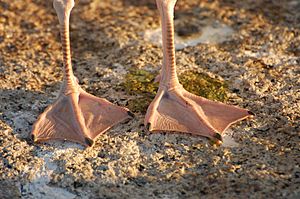Webbed feet facts for kids

Webbed toes is when two or more toes grow together. Instead of being separate, they are connected by skin. This is also known as syndactyly.
Many animals have webbed feet. They are very common in birds like ducks and swans. You can also find them on amphibians such as frogs. Some mammals, like kangaroos and platypuses, also have them. For these animals, webbed feet are a helpful feature.
Why do animals have webbed feet?
Webbed feet help animals move around in their environment.
Swimming
For animals that live in water, webbed feet are like natural paddles.
- Birds: Ducks, geese, and swans use their webbed feet to push water. This helps them swim fast and easily.
- Amphibians: Frogs use their webbed feet to swim and jump in water.
- Mammals: Animals like the platypus use their webbed feet for swimming.
Other uses
- Bats: Bats have skin between their "finger" bones. This forms their wings, which helps them fly.
- Digging: Some animals use their webbed feet to help them dig in soft ground.
Webbed toes in humans
In humans, webbed toes are not common. It is a condition that happens when a baby is developing. About 3 to 10 out of every 10,000 babies are born with webbed toes. It usually does not cause any problems. Sometimes, doctors can separate the toes with a simple surgery.
Images for kids
-
Webbed foot of a mute swan. This shape helps the swan swim well.
-
The webbed foot of a Common frog. This shape helps the frog swim efficiently.
 | Chris Smalls |
 | Fred Hampton |
 | Ralph Abernathy |






